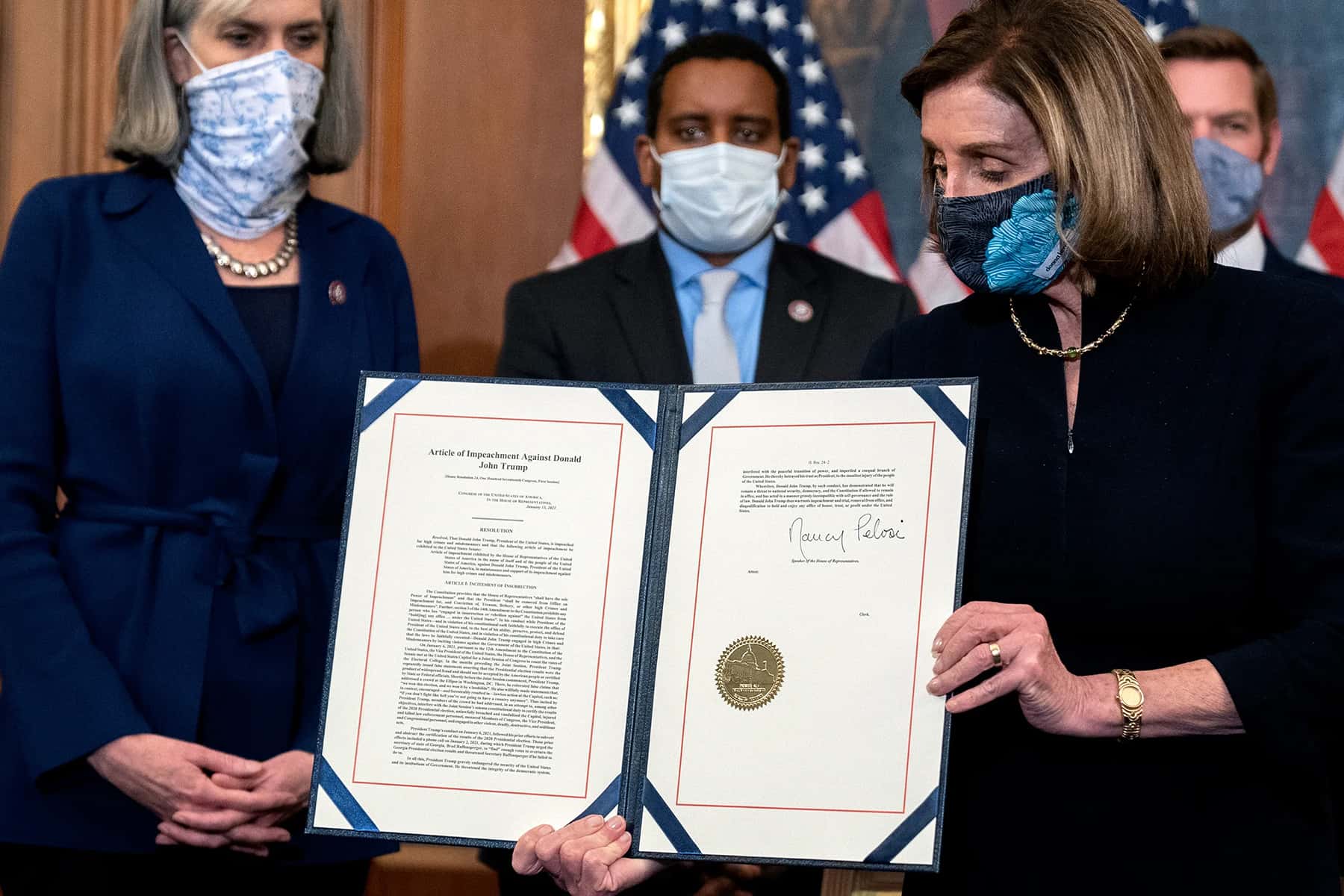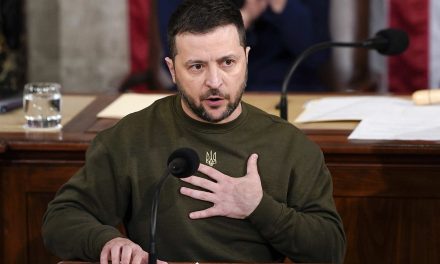
At 4:22 on January 13, the House of Representatives passed the number of votes necessary to impeach Trump. In the end, 232 Representatives — 222 Democrats and 10 Republicans — agreed that the president had incited an insurrection and must be removed from office. But 197 Republicans disagreed.
And so, Donald Trump makes the history books as the first president of the United States of America to be impeached twice.
This is an indictment of him, of course, but also of the Republican Party that let him off the hook a year ago for undermining the national security of the United States as he tried to steal the 2020 election. Shortly before the Senate vote on conviction almost exactly a year ago, House impeachment manager Adam Schiff (D-CA) charged his Republican colleagues to look to the future, telling them, “you know you can’t trust this President to do what’s right for this country. You can trust he will do what’s right for Donald Trump. He’ll do it now. He’s done it before. He’ll do it for the next several months. He’ll do it in the election if he’s allowed to.”
But every Republican senator other than Mitt Romney (R-UT) voted to acquit the president of abuse of power and obstruction of Congress. And now, here we are.
A week ago, our Capitol was overrun by insurgents seeking to overturn the results of the 2020 presidential election and install Trump in the White House for at least another term. In their fury, they murdered a Capitol Police officer and came within a hair’s breadth of getting their hands on our elected officials.
The insurgents were answering the call of their president, who urged them to fight for him and claim a victory he insisted, without evidence, had been stolen from him. As they stormed the Capitol and aid did not come for the besieged lawmakers, Trump watched events unfold on the television, pleased… and, as people have begun to note, curiously unsurprised.
In the week since the January 6 attack, emerging information indicates the insurgency was planned, not spontaneous, and that lawmakers might be involved. Democrats have stood up to this attack on our democracy, but Republicans are in the same bind they’ve been in for years: how can they both keep Trump’s voters and reject Trump himself? Some establishment Republicans who have their own bases of power – Senators Lisa Murkowski (R-AK) and Romney, for example – have finally said enough is enough, and have come out against the president.
But Republican lawmakers whose only base is Trump supporters have downplayed the attack that killed five people, including a police officer, and wounded many others; defended Trump; and argued that any attempt to remove him is simply a dangerous Democratic effort to create divisions in society. They warn that holding Trump accountable will anger his supporters even more, an observation that many interpret as a threat.
This Republican split showed up today. Liz Cheney (R-WY), chair of the House Republican Conference, blamed the president for the attack on the Capitol and voted to impeach him. But only nine other Republicans joined her. House Minority Leader Kevin McCarthy (R-CA) tried to split the baby by blaming the president for the attack on the Capitol but voting against impeachment. Trump loyalists like Jim Jordan (R-OH), who just received the Medal of Freedom from Trump, continued to allege that the election was tainted. They supported Trump wholeheartedly and attacked the Democrats. Refusing to acknowledge that their attacks on the election created the crisis in the first place, they called for unity and blamed the Democrats for dividing America.
One hundred and ninety-seven Republicans voted against impeaching the president. A year ago, Schiff infuriated Republicans by repeating a rumor published by CBS News that White House officials had warned party members: “Vote against the president and your head will be on a pike.” Rumors again swirled that a number of Republicans did not dare to vote in favor of impeachment because they feared for their safety and that of their loved ones.
While the House debated impeachment, the FBI continued to hunt down the insurgents, companies withdrew support from Republicans who supported the attacks on the election, and New York City canceled $17 million worth of contracts with the Trump administration.
The article of impeachment now goes to the Senate. Majority Leader Mitch McConnell (R-KY) suggested yesterday that he supported impeachment, but today said he would not change the Senate’s schedule to permit a trial before January 19. McConnell was likely pushing impeachment to pressure Trump to resign but, having failed, will do the bare minimum to guide the Republican Party past this moment. He needs to bend just enough to loosen up the purse strings of the companies who are saying they won’t continue to support Republicans who attacked our elections and launched a coup.
In the next week, Trump Republicans might be able to convince Americans that holding Republican insurrectionists responsible for their actions is Democratic overreaction. In that case, the Republicans can avoid taking a stand either for or against Trump while they turn this moment into a referendum on the Democrats just as they take power in the national government. They are running this play headlong, complaining bitterly, for example, about the new metal detectors installed at the entrance to the House chamber – even as National Guard personnel patrolled the Capitol to protect them – and complaining about “censorship” to television cameras after Twitter, Facebook, and YouTube removed QAnon accounts and Trump’s accounts.
It could also be that, as more information comes out, the story will get even worse, and it will be easier for senators to vote to convict, especially once Trump is out of office. Yesterday’s briefings by the FBI and acting U.S. Attorney for the District of Columbia Michael Sherwin gave notice that the evolving story of what happened on January 6 will be shocking and could well involve figures in government.
More than 30 House Democrats have called attention to an unusual number of Capitol tours held on January 5, at a time when coronavirus restrictions have largely ended tours. Those tours, combined with the fact that the insurrectionists appeared to have a detailed knowledge of the Capitol complex, have led to suspicions that some members of Congress might have offered aid to the rioters.
A sign that there is something big still hanging out there came tonight in the form of a taped video by Trump himself, emphasizing that he disavowed violence and defending the right to free speech protected in the First Amendment to the Constitution. It sounded like a charge and a defense. To release such a video means he must be worried indeed about his legal exposure.
Another sign is that virtually no one in the White House tried to defend Trump from today’s impeachment. There were no talking points, no briefings, no interviews, no calls to lawmakers. Even White House Counsel Pat Cipollone, who defended the president at his first impeachment last year, wanted people to know he was not defending him this time.
Furious and isolated, Trump is lashing out at those he blamed for getting him into this mess. He has told aides that he wants personally to approve any expenses his lawyer Rudy Giuliani ran up as he traveled around the country to challenge election results, and he has told them not to pay Giuliani’s legal fees. Trump had largely given up governing after the election anyway, but now our government seems to be operating haphazardly.
Almost exactly a year ago, on January 23, 2020, Adam Schiff urged Senate Republicans to convict Trump for abusing his power and obstructing Congress, and to remove him from office. “Now,” he said, “you may be asking how much damage can he really do in the next several months until the election?
“A lot,” Schiff said. “A lot of damage.”
Stеfаnі Rеynоlds
Letters from an Аmerican is a daily email newsletter written by Heather Cox Richardson, about the history behind today’s politics













